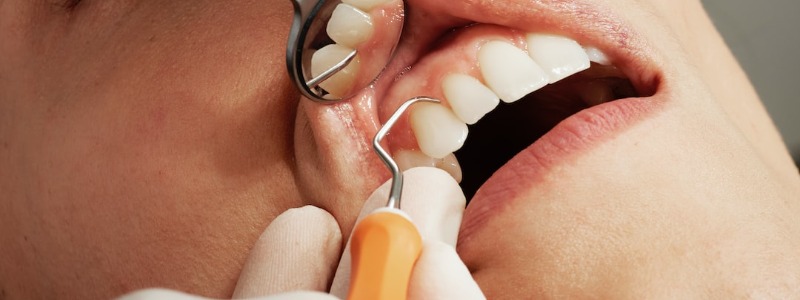A Study on the Link Between Obesity and Gum Disease
For better or worse, your eating habits impact the health of your mouth. Unfortunately, it’s not always as simple as avoiding sugary foods to prevent cavities. In some cases, your diet can exacerbate more serious forms of gum disease from the inside out.
A study by the University of North Carolina School of Dentistry, Oral Health Institute sheds new light on a potential link between obesity and periodontal disease. Published in the Journal of Dental Research, the official publication of the International and American Associations for Dental Research (IADR/AADR), the study is titled “MicroRNA Modulation in Obesity and Periodontitis.”
Periodontitis is a gum infection that can wreak havoc on your gums, the nearby bones, and the tissue connecting the two. It can result in tooth loss and bleeding gums.
What is Gum Disease?
Gums are a critical part of maintaining healthy teeth and avoiding infection. Gum disease is an inflammation of the gums which can lead to tissue deterioration, bone destruction, and tooth loss. Bacteria cause it in your dental plaque, building up and infecting your gum tissue. If caught early enough, gingivitis—the mildest form of the disorder—can be reversed. However, if left untreated, it may develop into periodontal disease with no cure.
Gum Disease Signs
It’s important to be aware of the symptoms of gum disease so you can detect any potential problems early. These may include:
- Receding gums
- Bleeding gums
- Changes to your teeth spacing or bite
- Purple or bright red gums
- Painful to chew
- Swollen, puffy, or sensitive gums
Risk Factors for Gum Disease
Poor oral hygiene is the primary cause of periodontitis, but other factors may also contribute. Some of the most common risk factors are:
- Stress
- Age
- Obesity
- Genetics
- Certain medications
- Using tobacco or tobacco products
- Poor nutrition
Obesity and Periodontal Disease
Studies have found a direct link between obesity and periodontal disease. Recent research shows that obese individuals are more likely to have severe cases of gum disease than those who maintain a healthy weight. Excess fat affects how your body responds to inflammation, preventing it from healing properly. Therefore, if you’re overweight and concerned about oral hygiene, it’s best to talk to your dentist about developing a preventative care plan or undergoing treatment for existing conditions.
Obesity has become an increasingly serious threat to the health and well-being of individuals across the globe. The latest statistics from the WHO) indicate that the prevalence of obesity has increased threefold since 1975, with hundreds of millions afflicted by this condition. Aside from raising the risk for diabetes, heart disease, stroke, and certain types of cancers, obesity can also increase the chances of developing periodontal diseases. Fortunately, preventive measures are available to lower the likelihood of either ailment. People can protect themselves from obesity and periodontal disease through healthy lifestyle choices such as regular exercise and a nutritious diet.
Study Overview
In this pilot investigation, lead author Romina Perri and her team set out to explore the possibility that obesity may modify microRNA expression, as well as any potential interactions between obesity and periodontal disease involving microRNA modulation. To achieve this, they collected gingival biopsy samples from 20 participants in four groups – non-obese participants with a healthy periodontium, non-obese participants with periodontitis, obese participants with a healthy periodontium, and obese participants with periodontitis.
Findings
Their analysis revealed that two microRNA species (miR-18a,miR-30e) were up-regulated among obese individuals with a healthy periodontium. Two other microRNA species (miR-30e,miR-106b) were found to be up-regulated in non-obese subjects with periodontal disease. Additionally, nine microRNAs were significantly up-regulated in the presence of both periodontal disease and obesity (miR-15a, miR-18a, miR-22, miR-103, miR-130a, miR-142-3p, miR-185, miR-210).
Implications
The authors believe these data are consistent with the concept that miRNA expression induced by chronic nutritional stress leading to obesity may also modulate inflammatory pathways within periodontal tissues. Former JDR Editor-in-Chief William Giannobile commented that the findings “provide[s] new insight into possible mechanisms of how risk factors might modify periodontal inflammation and may represent novel therapeutic targets.” A perspective article by Francesco D’Aiuto and Jean Suvan from the University College London Eastman Dental Institute also suggested that these findings could represent a breakthrough in our understanding of the impact of obesity on periodontal tissue destruction. However, further studies with larger and better-characterized cohorts are needed to confirm these results.
Preventing Obesity and Periodontitis
It is becoming increasingly clear that the obesity epidemic not only has physical health implications but also dental health ones as well. To counteract these crises, individuals must take proactive steps to adapt their lifestyles to promote health and prevent illness.
Caloric Balance
The primary cause of obesity is an imbalance between calories consumed and burned, meaning that individual choices and societal conditions can contribute to obesity. Genetics are also thought to play a role in developing obesity, making it even more important for individuals to be aware of the external influences affecting their health.
Healthy Lifestyle Practices
The first step in preventing gum disease and obesity is to make healthy dietary choices and incorporate regular exercise into your daily routine. Limiting sugary and fatty foods while increasing consumption of fruits, vegetables, legumes, and whole grains will help reduce obesity and enhance oral health. Studies have even found that vitamins from nutritious foods can clean your teeth and strengthen your bones, gums, and teeth while helping wash away plaque.
Conclusion
Obesity and periodontitis do not need to be lifelong struggles; with proper education about nutrition and regular exercise, you can live a fuller and healthier life. By limiting processed goods full of sugar and fat while consuming plenty of vitamin-rich foods, individuals can not only reduce their risk of obesity but also improve their oral health.

